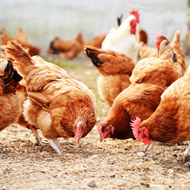Fat 'crucial' for Marek's disease virus infection

Worldwide losses relating to MDV are estimated to cost up to $2 billion.
The storage and production of fat is crucial for Marek’s disease virus (MDV) to replicate in chickens, according to new research.
The study, published in the Journal of Virology, identifies new pathways that are involved in the development of the disease. Scientists say these can help to generate control strategies for the virus which could reduce its spread.
Study author Dr Shahriar Behboudi from The Pirbright Institute said: “Some viruses exploit host cell machinery to produce components required for their replication and spread. We found that MDV uses the host cells to produce and store fats, contributing to the replication of the virus and possibly clogging the arteries.”
MDV is a highly contagious disease of chickens that leads to the build-up of fatty substances in the arteries. The disease is a major threat to the poultry industry, with worldwide losses relating to MDV estimated to cost up to $2 billion.
Researchers identified chemical inhibitors that disrupted two different but connected fat-production pathways which significantly reduced virus replication.
The scientists say that while these inhibitors helped them to identify the cellular mechanisms the virus disrupts, they would not be suitable for anti-viral development owing to their side effects. There would also be the possibility of transfer to meat and eggs.



 The Animal and Plant Health Agency (APHA) has updated its online reporting service for dead wild birds.
The Animal and Plant Health Agency (APHA) has updated its online reporting service for dead wild birds.